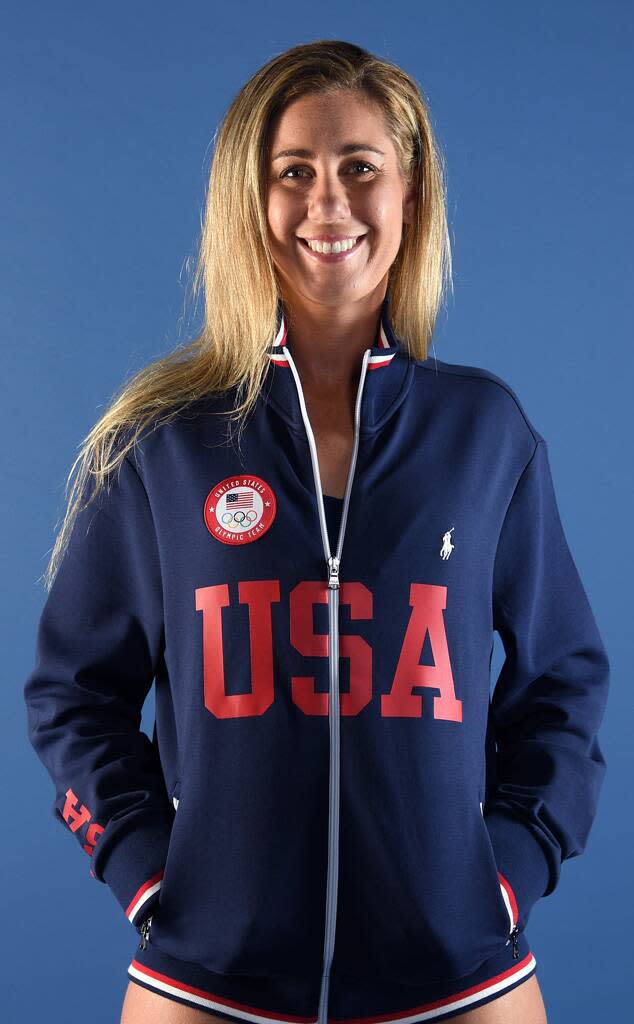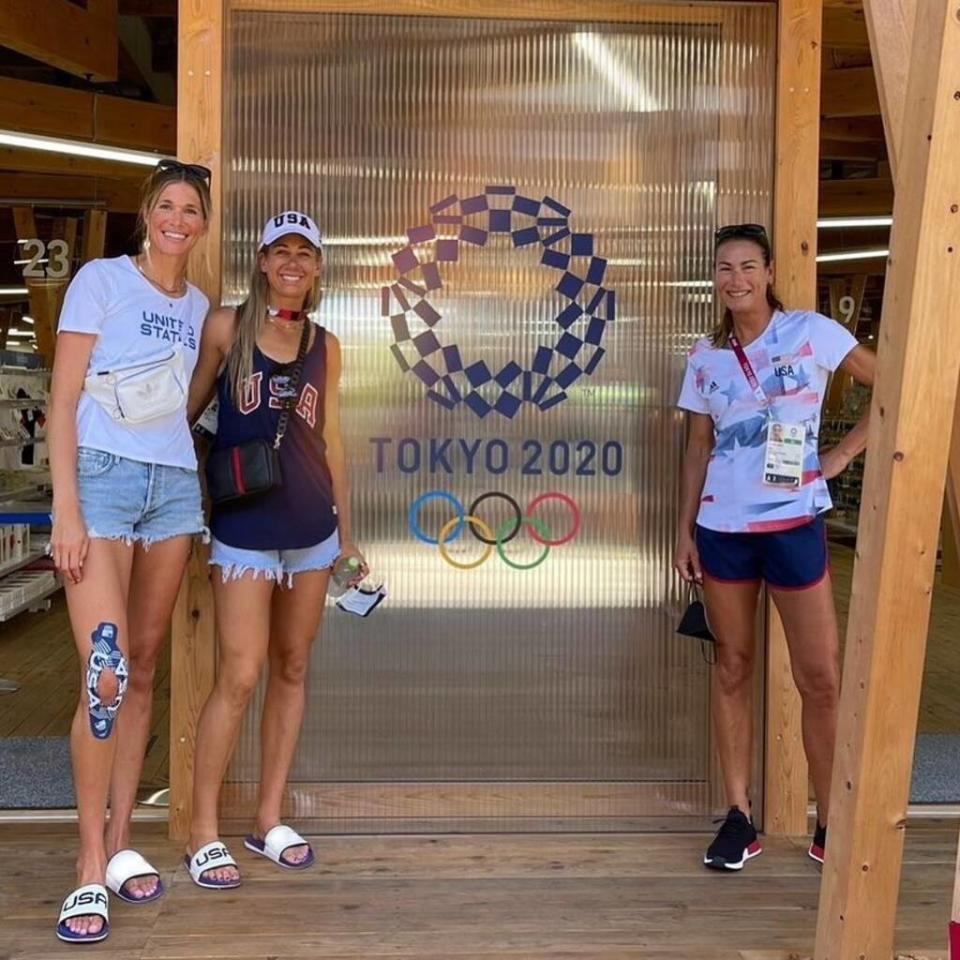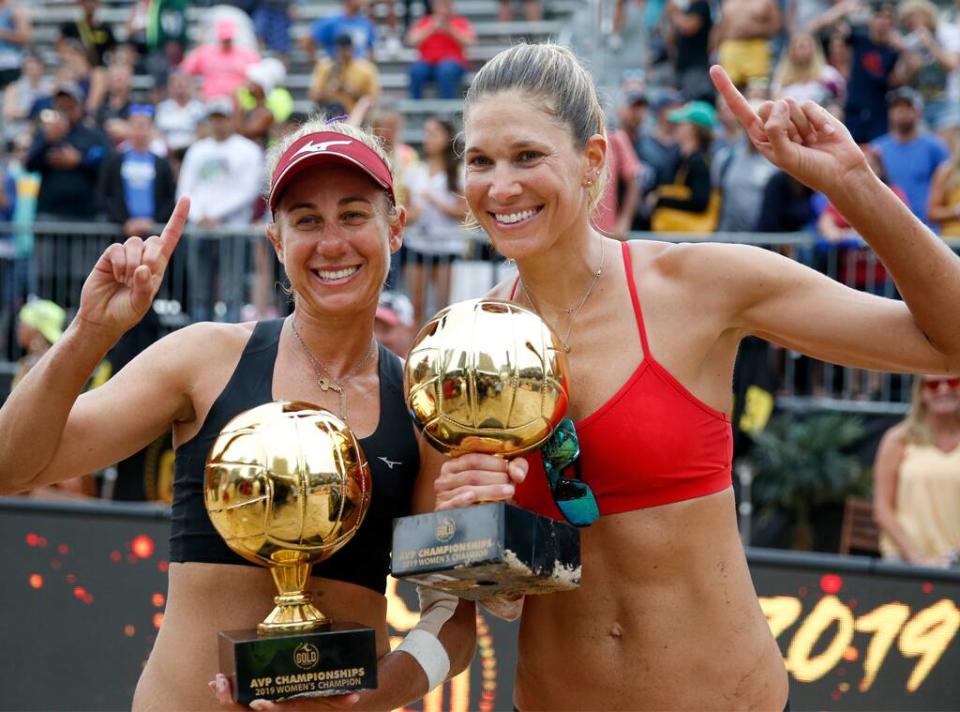Olympic Volleyball Player April Ross Has an Urgent Health Message That You Need to Hear
- Oops!Something went wrong.Please try again later.
- Oops!Something went wrong.Please try again later.
At this point, professional beach volleyball player April Ross has acquired quite the accessories collection, having amassed Olympic medals in every hue. But there's one neckpiece that might mean even more than all the gold, silver and bronze in the world: A Tiffany open heart pendant mom Margie Ross gifted her while she was in high school.
Having lost her mother to metastatic breast cancer when she was a 19-year-old sophomore at the University of Southern California, "It's definitely a keepsake to me," the Olympian shared in an interview with E! News. "It was such a nice gift and so special."
So it only comes out on extremely special occasions, such as when she and then-teammate Jen Kessy went to the 2012 Olympics in London. "I brought it out to wear it, just because it was such a huge momentous moment and I wanted to bring my mom with me in some way," she explained.
Breast Cancer Survivors Reveal Their Best Advice
Ross repeated the ritual at the Rio Games in 2016, with then-partner Kerri Walsh Jennings.
"But it's kind of funny," she noted, "in London I wore two necklaces, so I wore the one my mom gave me and another one. And in Rio, I did the same. And, you know, I got the silver and the bronze."
So when she and Alix Klineman made their way to Tokyo this past summer for the 2020 Olympics, "I'm like, 'I'm only going to wear the necklace my mom gave me,'" Ross shared. "And I only wore that one and we ended up with the gold, so I think that was the key."
Certainly it seemed her mother was watching every last serve, block and spike. "When I'm out there talking to her," she said, "yeah, I really feel like she's with me."

Margie is also the driving force behind Ross' latest mission. The 39-year-old athlete is marking Breast Cancer Awareness Month this October by partnering with GE for their #Don'tSkip campaign reminding women of the importance of receiving yearly mammograms.
"It's a huge issue for me and obviously stems from my mom having breast cancer when I was growing up," Ross shared, "and seeing her battle with it and she eventually passed from it when I was in college and that was just a really tough thing for me."
Mentioning a study that shows women who receive annual mammograms have a 60 percent lower risk of dying from the disease in the decade following their diagnosis, Ross explained that teaming up with GE to reach out to the quarter of women who opt out of the annual practice was a no-brainer.
"To be able to take my experience and channel it into awareness," she said, "and hopefully helping other people through prevention, it's important to me and really meaningful."
And Ross has been practicing what she preaches for more than a decade now.
Though the American Cancer Society recommends beginning the annual practice at age 45, "I've done a decent amount of research on my own," notes Ross. "I was reading if you have a family member with breast cancer, like my mom, it was recommended that I start 10 years before her diagnosis, which, I believe was around 38. So I tried to start as soon as I could after that point."
And, yes, she's aware it's not, like, the most fun way to spend an afternoon. "I actually just got my yearly mammogram yesterday," she revealed, "and, yeah, it can be a little bit uncomfortable."
But GE is making strides to improve the experience with their Pristina, the first mammography designed by a team of female engineers. "You actually have more control over it," described Ross. "You can adjust the pressure to what is a little bit more comfortable for you."
As for the other anxieties surrounding the whole procedure, the California native gets how scary even thinking about the C-word can be. "It's hard, you grapple with it in your head, but the sooner you know anything, the better your chances are of fighting it," she explained.
Plus, noted Ross, you can leave feeling like a real badass. "Taking care of your own health and doing something that's scary is really brave and empowering and to have that knowledge, it gives you power to take action if need be," she stressed. "So it might feel intimidating, it might feel a little scary, you don't know what to expect, but once you do it, it's not as scary as you expect."

Though she admits it took her a beat to reach this point.
Immediately after her mom's passing, "My immediate reaction was, 'Oh my gosh, life can be so short and I need to go out and make sure I'm charging life and making the most of every moment,'" Ross recalled of her throwing-caution-to-the-wind phase. "And that can be detrimental and I think immediately I kind of took it too far."
In the two decades since, "I've dialed it back," she acknowledged, "and wanted to use that experience to help other people."

In addition to touting the importance of mammograms—"I know some people kind of fall off when they get good results for a couple years in a row," she said, "but to really dial in that prevention, you have to go every year"—she's leaned into a whole host of good wellness habits.
"It's been a process and a learning experience," she admitted. "I think a lot of people assume that athletes are just very healthy naturally. I think you have to really be on it. And especially if you're burning all these calories every day, and you're not gaining weight, sometimes it's easy to justify not being super healthy. And so over the years and as I get older, it's become more important to me to just be healthy in every sense of the word."
That's meant leaning into meditations and other forms of de-stressing. "I think that's a huge part of prevention, being really grounded and not in a fight-or-flight mode all the time," she described. Plus, she cut back on sugar and alcohol consumption, only pouring herself the occasional glass of natural wine "here and there."
Though she might let a bit of those diet practices slide now that she's embarking on her off-season—following victories in the Manhattan Beach and Chicago Open and a bronze finish at the Sardinia Beach Finals.
"Definitely some extra carbs," she joked of what was on the agenda for the next several months. And a bit of leisure. "I'm a big snowboarder and I haven't gone on a snowboard trip in about three years," she shared, "so I'm going to go on a few of those, going to Montana for a week. I'm really going to turn it off."
Naturally, she's still going to work out and lift weights and take care of herself, "but no, like, real volleyball training for awhile." And though Ross definitely plans to be back on the sand next spring, she's not entirely sure how the season will shake out. "I really haven't given it a ton of thought yet," she acknowledged. "I'm just trying to almost ignore it so I can relax a little bit."

Should she need extra motivation when it's time to get back on her grind (unlikely for a world-class athlete, but just in case), she can reflect on that winning moment this past August in Tokyo's Shiokaze Park.
As temps climbed over 90 degrees, she and Klineman—known to fans as the A Team—steadily toppled their competition, culminating in straight set wins over Australia's Taliqua Clancy and Mariafe Artacho del Solar in the gold medal match.
Despite entering as favorites, "All the way through the Games, every team we went up against, we were really nervous and we respected every single team and knew that they were a threat," said Ross. "So we took it so seriously and the fact that we were able to get through the Olympics so successfully and then kind of dominate, I guess, in the final match against a team that we've had a ton of trouble with in the past, it was just hard to wrap my mind around that."
As she and Klineman embraced in the sand, "I think the number one thing we kept saying after the fact, was, 'I can't believe we just did that,'" Ross continued. "For me, I think as time has gone on a little bit, it's been really fun to just reflect on how crazy it is that I was able to get my gold medal on my third try and at 39 years old, and I just hope that maybe that inspires other people to continue chasing their dreams."

